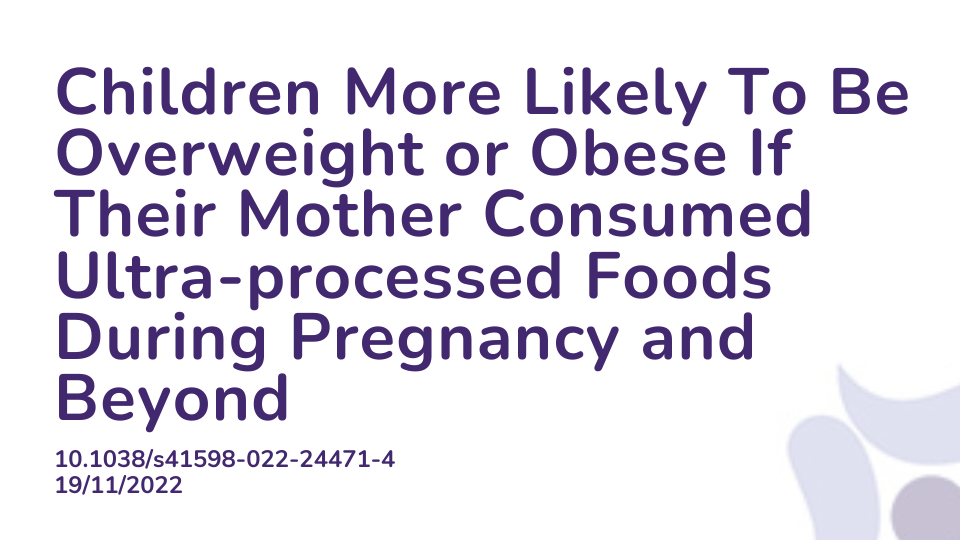Summary:
Obesity in children is increasing at an alarming rate, which also increases a child’s likelihood of serious chronic illnesses such as cardiovascular disease, diabetes and cancer. A major contributing factor to the obesity epidemic among children is an unhealthy diet and an increased consumption of ultra-processed foods, which in many countries constitutes over half of a childs total consumed calories. Ultra-processed foods are energy dense products made from refined ingredients using a variety of industrial processes. They contain a series of additives such as stabilizers, artificial flavors and colors, and contain minimal nutrients or whole food ingredients. They are much higher in sugar, sodium, and saturated fat compared with whole foods. Evidence has consistently linked ultra-processed foods to being overweight or obese in children and adults. The objective of this paper was to assess whether ultra-processed food intake by a mother during pregnancy through to a child’s early life is associated with a child’s risk of weight issues during their childhood and adolesence. The results showed that a child is more likely to be overweight or obese if their mother consumed ultra-processed food during the prenatal and post birth period. This data supports the inclusion of dietary intervention during the maternal period in order to promote reproductive and offspring health.
Abstract:
Objective: To assess whether maternal ultra-processed food intake during peripregnancy and during the child rearing period is associated with offspring risk of overweight or obesity during childhood and adolescence. Design: Population based prospective cohort study. Setting: The Nurses’ Health Study II (NHSII) and the Growing Up Today Study (GUTS I and II) in the United States. Participants: 19 958 mother-child (45% boys, aged 7-17 years at study enrollment) pairs with a median follow-up of 4 years (interquartile range 2-5 years) until age 18 or the onset of overweight or obesity, including a subsample of 2925 mother-child pairs with information on peripregnancy diet. Main outcome measures: Multivariable adjusted, log binomial models with generalized estimating equations and an exchangeable correlation structure were used to account for correlations between siblings and to estimate the relative risk of offspring overweight or obesity defined by the International Obesity Task Force. Results: 2471 (12.4%) offspring developed overweight or obesity in the full analytic cohort. After adjusting for established maternal risk factors and offspring’s ultra-processed food intake, physical activity, and sedentary time, maternal consumption of ultra-processed foods during the child rearing period was associated with overweight or obesity in offspring, with a 26% higher risk in the group with the highest maternal ultra-processed food consumption (group 5) versus the lowest consumption group (group 1; relative risk 1.26, 95% confidence interval 1.08 to 1.47, P for trend<0.001). In the subsample with information on peripregnancy diet, while rates were higher, peripregnancy ultra-processed food intake was not significantly associated with an increased risk of offspring overweight or obesity (n=845 (28.9%); group 5 v group 1: relative risk 1.17, 95% confidence interval 0.89 to 1.53, P fortrend=0.07). These associations were not modified by age, sex, birth weight, and gestational age of offspring or maternal body weight. Conclusions: Maternal consumption of ultra-processed food during the child rearing period was associated with an increased risk of overweight or obesity in offspring, independent of maternal and offspring lifestyle risk factors. Further study is needed to confirm these findings and to understand the underlying biological mechanisms and environmental determinants. These data support the importance of refining dietary recommendations and the development of programs to improve nutrition for women of reproductive age to promote offspring health.
Article Publication Date: 5/10/2022
DOI: 10.1136/bmj-2022-071767



